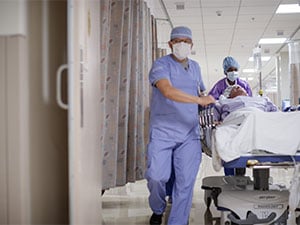Colorectal Cancer Information
The term "colorectal cancer" refers to any cancer that develops in the colon (large intestine) or the rectum, which connects the colon to the anus. Sometimes, the conditions "colon cancer" and "rectal cancer" are referred to separately based on where the cancer originates, but the two cancers share important commonalities, such as risk factors, symptoms and diagnostic and treatment strategies.
Contact us today to schedule an appointment. Call us at 1-888-663-3488 or request an appointment online.
What is colorectal cancer?
In general, cancer is a condition that develops when a group of cells begins to reproduce uncontrollably. Cancer can originate anywhere in the body, and if left untreated, can spread to other tissues and organs (metastasize). Colorectal cancer often develops slowly over several years, starting as a noncancerous polyp on the inner lining of the colon or rectum. Some, but not all, polyps can become cancerous. Routine tests and regular screening can often detect the presence of polyps, increasing the chances of catching colorectal cancer when the condition is most treatable.
Why does colorectal cancer develop?
The American Cancer Society estimates that around 1 in 23 women and 1 in 21 men in the United States will develop colorectal cancer at some point in their lives. How does this happen, and why is it so common? The mechanisms behind the cellular changes that cause cancer are not fully understood within the medical community, but researchers have identified several risk factors that may increase the likelihood of developing colorectal cancer.
Having one or more risk factors does not mean that colorectal cancer is inevitable. It's also possible to develop colorectal cancer without having any known risk factors. Individuals who may be at an increased risk of this disease should be especially mindful of unusual or worsening symptoms and promptly report them to a medical professional.
What are the symptoms of colorectal cancer?
 Colorectal cancer may not cause noticeable symptoms in its early stages. As the disease progresses, some patients experience:
Colorectal cancer may not cause noticeable symptoms in its early stages. As the disease progresses, some patients experience:
- Unusual changes in bowel habits that persist for several days, such as narrow stools, diarrhea or constipation
- A feeling that the bowel does not empty completely
- Very dark or bright red stools, which may indicate blood
- Unexplained weight loss
- Abdominal pain or cramping
- Fatigue
- Vomiting
It’s possible for colorectal cancer to spread (metastasize) to the liver or another part of the body. Common signs of metastasis include yellowing of the skin or eyes, an enlarged liver and labored breathing.
Colorectal Cancer in Younger Adults
According to research from the American Cancer Society, the rate at which younger groups of people are diagnosed has been increasing. The proportion of cases in people younger than 55 years old increased to 20% by 2019 and is on the rise. People at average risk are advised to get regular colorectal cancer screenings by age 45 and older.
How is colorectal cancer treated?
Colorectal cancer treatment often begins with surgery to remove cancerous tissues and surrounding lymph nodes. The ideal surgical approach will vary according to the specific location and cellular makeup of the cancer, as well as the patient’s age, overall health and care preferences. If large portions of the intestines or rectum are removed, additional surgery to restore bowel function may be performed.
 Surgical treatment may be combined with chemotherapy and radiation therapy to help shrink tumors and destroy cancer cells that remain after surgery. New breakthroughs in cancer treatment, such as immunotherapy and targeted therapy, may also be effective for patients with advanced cases of colorectal cancer.
Surgical treatment may be combined with chemotherapy and radiation therapy to help shrink tumors and destroy cancer cells that remain after surgery. New breakthroughs in cancer treatment, such as immunotherapy and targeted therapy, may also be effective for patients with advanced cases of colorectal cancer.
Moffitt's approach to colorectal cancer treatment
Moffitt Cancer Center’s Gastrointestinal Oncology Program includes board-certified physicians who are highly specialized in diagnosing and treating colorectal cancer. Our team of colorectal cancer specialists treats a high volume of colorectal tumor patients every year, and each patient receives individualized attention from our collaborative tumor board–an assembly of surgical oncologists, radiation oncologists, interventional radiologists, nurses and other cancer specialists who meet routinely to discuss each patient’s case. The tumor board assesses the patient’s condition and maps out a treatment plan that pays special attention to his or her unique circumstances, and then monitors his or her progress throughout the treatment program.
The colorectal cancer treatments we offer at Moffitt are available to anyone, including those who:
- Have recently been diagnosed with colorectal cancer
- Are in need of a second opinion
- Are concerned about rectal or colon cancer and are seeking initial diagnostic testing
- Have had a recurrence of colorectal cancer and want to consult with a new physician
- Have other conditions that may make cancer treatment more complicated
- Are having trouble finding care that is right for them
Our collaborative approach to treatment, combined with our ambitious clinical trial program and research efforts, has led to Moffitt being named a Comprehensive Cancer Center by the National Cancer Institute. We are currently the only such center based in Florida.
To learn more about colorectal cancer or to consult with colon or rectal cancer specialists within our program, call Moffitt Cancer Center at 1-888-663-3488 or fill out our convenient online new patient registration form. We also encourage routine colorectal cancer screenings for adults over the age of 45 – follow this link for more information.
Support the Future of Gastrointestinal Oncology Research and Treatment
When you support Moffitt Cancer Center, you help make breakthrough gastrointestinal research and innovative treatments possible.
Give now to support the Gastrointestinal Oncology Program. For more information, call toll-free 1-800-456-3434, ext. 1403.
